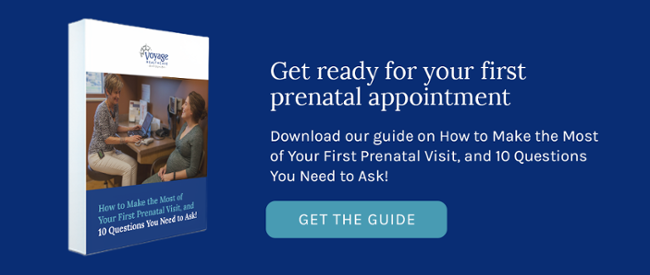If you recently learned that you’re pregnant, congratulations!
You’ll probably be seeing the doctor more often than usual over the next nine months. But how often should you plan to go in?

Here’s a general appointment schedule for uncomplicated pregnancies, broken down by trimester. We’ve also included a list of common prenatal tests and vaccines you’ll want to check off your list before welcoming your baby.
Remember, every pregnancy is different, and this is just a general guide. Ask your doctor if you have questions about your specific prenatal care plan.
1. First Prenatal Visit
Your first prenatal visit usually takes place when you are about 10-12 weeks pregnant (a pregnancy confirmation visit and possibly an early ultrasound typically occurs between 5-8 weeks). This appointment is often the longest, and will include a general physical and routine prenatal labs.
You probably have a lot of questions about your pregnancy, and your first prenatal visit is a great time to get a lot of questions answered. What should be on your list to ask? Check out our guide to Making the Most of Your First Prenatal Visit, including 10 Questions You Need to Ask Your Provider.
2. Routine Check-Ups
For uncomplicated pregnancies, you should expect to see your provider every four weeks through 28 weeks.
Between 28 and 36 weeks, expect to see your doctor every two weeks.
From 36 weeks to delivery, expect to see your provider weekly.
Each check up will include a weight check, blood pressure check, and chance to listen to the fetal heartbeat. The fetal heartbeat is usually first detectable with a hand-held doppler between 10 and 12 weeks.
Remember, this is a general guide. You’ll need to see your doctor more frequently if you experience any pregnancy complications, including gestational diabetes or a multiple pregnancy.
3. Screenings
In addition to routine check ups, some of your prenatal appointments will include health screenings.
Here’s a list of routine screenings and when they commonly occur.
Anatomy Ultrasound: 20 weeks
You can find out the sex of the baby at this appointment. Wondering what else happens at an anatomy ultrasound? Here’s a breakdown.
Gestational Diabetes and Anemia: between 26 to 28 weeks
Diet and exercise can reduce your risk of gestational diabetes. However, some women still develop gestational diabetes for reasons that doctors do not fully understand. If you develop gestational diabetes, your doctor may recommend treatments ranging from diet adjustments to insulin injections. See this helpful Mayo Clinic guide for more information.
Anemia, or a lack of healthy red blood cells, often develops during pregnancy as your blood volume increases. This deficiency can usually be remedied with iron supplements or vitamins. See this American Pregnancy Association guide for more information.
Tetanus and Diphtheria (Whooping Cough) Vaccine: 28 weeks
Protect your baby by getting the tetanus and diphtheria vaccine.
Remember, even if you’ve had this vaccine administered before, it’s important to get it with each pregnancy so the antibodies have a chance to build up and be passed to your baby.
Rhogam (for “Rh negative” blood types): 28 weeks
If you are Rh negative, you will need a RhoGAM shot at 28 weeks of pregnancy, and 72 hours after delivery. This prevents complications if you are Rh negative and your baby is Rh positive. See this Pregnancy Corner article for more information.
Group Beta Strep: between 35 to 37 weeks
According to the American Pregnancy Association, “25% of all healthy, adult women” test positive for the Group B streptococcus bacteria. Although this is not usually a threat to their health, it can be passed to the baby during delivery and put the baby at risk. Your doctor will prescribe antibiotics to protect your baby.
Prepare for Your First Prenatal Visit
You probably have a lot of questions for your provider.
Your first prenatal appointment is a perfect time to get these questions answered. Before you go, writing down your questions is a great way to keep track of them and make sure they all get answered.
Wondering what should be included on your list of things to ask? Check out this guide to Making the Most of Your First Prenatal Visit, including 10 Questions You Need to Ask Your Provider.




Comments